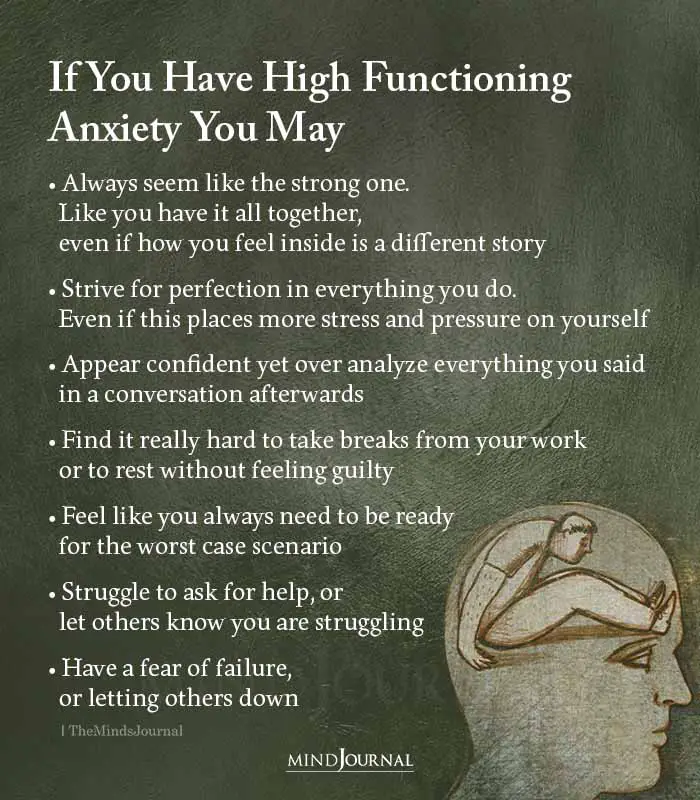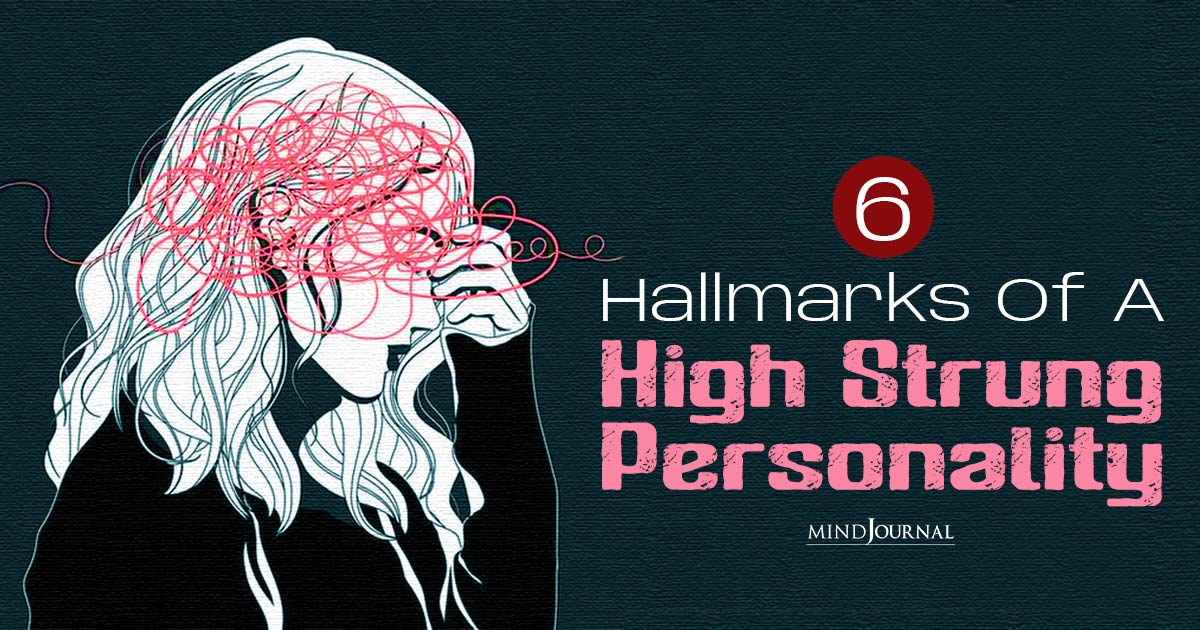Do you ever feel like you’re wound up like a tight spring? If your answer is yes, then chances are you have a high strung personality. You feel like you are on the edge all the time and only a little flick will throw you off.
Stress and anxiety are your best friends, and no matter how much you may try to relax and let go of your uptight nature, it just doesn’t seem to work. However, don’t think that there’s something wrong with you. You are a perfectly normal human being, who just feels a bit more anxious than other people (stop being too hard on yourself!)
Today, we are going to talk about what does being high strung really means, what causes high strung personality, and how to stop being high strung. Let’s first talk about what is a high strung personality.
Related: Quietly Struggling: 15 Signs You’re an Introvert with High-Functioning Anxiety
What Is A High Strung Personality?
A high strung personality is like having a live wire for a mindset. You are always on edge, jumping at the slightest noise or change in plans; someone who’s constantly wound up, ready to snap at any moment.
It’s not that you’re trying to be difficult; it’s just how you’re wired. You thrive on structure and routine, but even the smallest disruptions can send you into a tailspin. You might come across as intense or overly reactive, but deep down, it’s all about your internal struggle to keep everything in check.
For example, you always meticulously plan every part of your day, from what you will have for breakfast to what movie you will watch before going to sleep at night. You get flustered if anything deviates from the plan, like unexpected traffic or a last-minute meeting just when you are leaving the office.
You feel your stress levels soar and you end up snapping at your colleagues due to the disruption in your schedule.

Now that we know what is a high strung personality, let’s talk about what causes high strung personality
What Causes High Strung Personality?
There can be many reasons behind your high strung personality, and knowing the causes can help you have clarity which can help you understand and handle it better.
- Genetic predisposition: You may inherit traits from your family members that cause you to be more high strung than normal.
- Environmental factors: Stressful or chaotic environments during childhood or adulthood can contribute to the development of a high-strung personality.
- Past traumatic experiences: Past traumas or adverse life events can heighten your sensitivity to stressful situations and increase the chances of you developing a high strung personality.
- Job pressure: When you experience too much stress in your workplace, it can exacerbate your high strung tendencies.
- Not knowing the right stress management skills: When you don’t know the correct ways to deal with your worries or pressure, you might end up reacting more strongly than necessary.
- Coping mechanisms: You end up adopting high strung behaviors in order to cope with feelings of insecurity, low self-esteem, or inadequacy.
- Neurological factors: Differences in your brain functioning and chemistry might make you more susceptible to reactivity and anxiety.
- The kind of parents you had: If you had extremely strict or demanding parents it can instill in you a need for control and perfectionism, leading to having a high strung personality.
Related: Listening To This Song Reduces Your Anxiety by 65%
6 Signs You Might Have a High Strung Personality
1. You are easily stressed.
You know you have a high strung personality, when even the smallest things set you off and it feels like you are losing your s***. You worry too much and have the tendency to make mountains out of molehills.
Being high strung, you’re always expecting the worst to happen and you always feel “ready” for disaster to strike. And if disaster does actually strike, you find yourself unable to handle the tough situation and all your contingency plans go out the window.
2. You strongly believe in perfectionism.
You are obsessed with perfectionism and even that is an understatement, to be honest. Your quest for perfection threatens to drive you mad, and you just can’t help yourself, even that little voice in your head tells you that it’s okay to not be perfect sometimes.
Your obsession with perfectionism makes you feel mad at times, but you just can’t seem to stop yourself from falling into that rabbit hole over and over again. No matter how much you achieve and accomplish, it’s never enough for you and you want more.
3. You find it hard to relax and let go.
We all need to chill out sometimes because it’s how we get rid of stress. If you find it hard to relax, it’s probably because of your high strung personality.
Taking a break or having some rest is not in your dictionary, and you think “Who has got time for that?” But by always being on the move and never just sitting still, even simply breathing can seem tough and make you anxious.
Your worry goes through the roof when there’s nothing “constructive” for you to do, for instance, in meetings and any social events.
4. You can get really aggressive sometimes.
You are not someone who beats around the bush nor do you mince your words, which makes you look quite aggressive at times. Adding to that, you don’t always say politically correct things and have no qualms about saying the truth even if it ruffles feathers.
Even though being brutally honest is an admirable quality to have, sometimes it can rub people the wrong way, even if you have good intentions. Your aggression is considered to be a liability in many situations, which makes you fall behind sometimes.

5. You are always rushing.
Being a high strung person, you are always rushing around, and dare I say, sometimes like a headless chicken. Since you always have a ton of responsibilities on your shoulders, you find it hard to juggle everything properly.
So you are always rushing around, trying to make sure everything happens smoothly, all the while trying to not lose your sanity. Because of this, you are tensed and anxious most of the time, which makes you extra sensitive to high-pressure situations.
6. You can’t sleep properly because of your overactive mind.
When you go to bed at the end of a long day, hoping to get a good night’s sleep, your mind says, “absolutely not!” Instead of sleeping and snoring away, your mind focuses on several events for you to think about, even if they’re irrelevant.
Insomnia and being high strung go hand in hand, and due to your high stress levels, you find it hard to sleep at night, and you wake up in the morning even more tired than the day before. You are constantly thinking, and obsessing about things that don’t really need your attention.
Now that we have talked about the signs of a high strung personality, let’s talk about how to stop being high strung.
How To Stop Being High Strung?
- Practice relaxation techniques: Be it meditation, yoga, or deep breathing, practicing even one of these things every day can make a huge difference in reducing stress and promoting calmness.
- Stay away from unrealistic expectations: Have fair expectations from yourself and try to have goals that are more doable and realistic.
- Prioritize self-care: Make time for activities that bring you joy and relaxation, such as hobbies, spending time with loved ones, or engaging in physical exercise.
- Learn the art of delegation: Instead of taking all the responsibilities on your shoulders, try to delegate as much as you can, and don’t feel shy to ask for help when needed.
- Try not to let your negative thoughts control you: Challenge negative thought patterns and replace them with more positive perspectives, so that you feel less anxious and tense.
- Set strict boundaries: How to stop being high strung? Boundaries are crucial if you are trying to handle your high strung personality. Protect your time and energy and don’t be afraid to say no when things get too overwhelming.
- Go for therapy: Don’t shy away from consulting a therapist, if things start to feel a bit too out of control. They’re professionals who can give you the support you need, and help you learn healthier coping mechanisms.
Related: Unusual Anxiety Symptoms: 11 Weird Things You Do Because Of Your Anxiety
Takeaway
So there you have it! Remember, dialing down on your high strung personality isn’t about changing who you are—it’s about finding balance. Take it easy on yourself, practice the above-mentioned techniques, and don’t be afraid to ask for a helping hand when you need it. You’ve got this!









Leave a Reply
You must be logged in to post a comment.